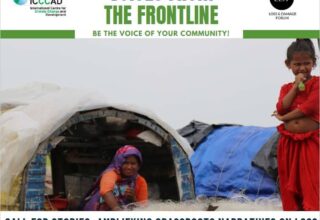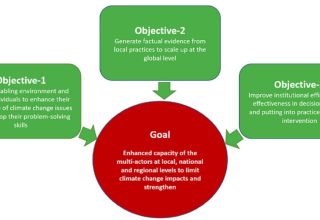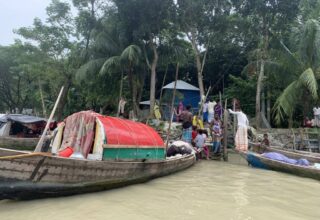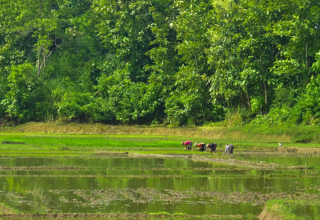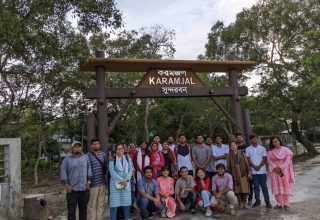
A cornerstone of the Paris climate agreement
The recently concluded COP 24, in Katowice, ended with the member states parties’ adoption of the rulebook for the effective implementation of the Paris Agreement at the national level. To accelerate the efforts for reducing greenhouse gas emissions and climate change adaptation several key factors need to be realized, mainly: Identifying, planning and implementing mitigation and adaptation actions, enhancing technology development and transfer, facilitating climate finance, educating, training and raising public awareness in the area of climate change, and finally a improving communication of relevant information. However, to be able to meet and fully implement the previously mentioned elements, there are four pre requirements factors that need to be met and are linked to the human, technical, institutional, and financial capacity of each country.
Indeed, without an appropriate level of what we could call “climate change capacity” of each state to evaluate, understand, and address the challenges posed by climate change as well as the international climate change frameworks and negotiations, the goals set in 2015 Paris agreement will remain dead letter. Thus, the question of capacity building, as the notion emerged in the 50s, is not only linked to the question of a financial support but primarily to the ideas of institutional strengthening, and human resource development. In other words, capacity building englobe a wide range of activities aiming at improving technical knowledge and skills within a given country to effectively fight against climate change. The end goal being to enable all countries to be in a position of effectively reducing their greenhouse gas emissions, adapting to the consequences of climate change, and raising public awareness towards climate change.
It is widely understood that the developing countries are the most vulnerable to climate change and have to combine their effort towards resilience with the need to preserve the gain from development not to be lost due to climate change. A good capacity-building program needs to take place at three levels: Individual (development of a qualify personnel, researcher, public officers, school curriculum etc), institutional (national research institution, government, financial management, etc) and systems (effective climate policies, mainstreaming climate into national planning, climate legal framework). It should also be country-driven, which not only consists of having a learning-by-doing approach but also an approach of addressing country specific priorities and situations, mobilizing existing national and sub-regional institution, and thus also enabling people and knowledge retention to keep building upon it and reducing dependencies on outside skills. It is also important to understand that capacity-building needs to be coupled with a continuous and long-term efforts and support as the processes needs to growth from within the countries alongside the constantly evolving needs for climate capacity-building.

The need to support developing countries in their capacity-building journey has been recognized since the adoption of the UNFCCC in 1992. Since then, the history of capacity- building has been marked by several key milestones starting with the COP7 in 2001 and the adoption of a specific framework for a country-driven and long term capacity building in developing countries. The Subsidiary Body for Implementation is in charge of assessing and review the implementation of the framework in developing countries as well as include new areas of capacity building into the framework such as loss and damage, readiness and access to climate finance, topics introduced by the Paris agreement.
Lately, Article 11 of the Paris Agreement, reaffirmed the need for capacity-building in developing countries and called for a enhanced financial and technical support from the developed countries. The new agreement also establishes a specific body dedicated to the question of capacity-building called the “Paris Committee on Capacity-Building.” The new body is in charge of assisting and identifying the needs and gaps, current and emerging in the area of capacity for implementing the Paris agreement in the developing countries as well as overseeing the capacity-building work plan for the period of 2016-2020. Thus, the body has the important role of introducing coherence and coordination for capacity-building activities undertaken under the UNFCCC. Additionally, to extend its reach the PCCB has launched a specific Facebook page dedicated to capacity-building, to scale up best – practices and promote synergy of action for capacity-building among a wide range of stakeholders.
At COP24, testifying of the growing recognition of the importance of capacity-building in the climate change fight, a specific “capacity building hub” was created with over 35 events focusing on the questions taking place. Among the various activities, December was fully dedicated to the second edition of the capacity-building day. The event also provided the occasion to have more time to discuss challenges and needs for capacity-building, in line with the 7th Durban Forum on capacity-building held in May. Organized around four sessions touching upon the questions of just transition, cities and local communities, climate finance and transparency, it gathered a large panel of experts and practitioners (such as researchers, academics, development practitioners, UN staff, consultants, youth delegates, policymakers, negotiators, and civil servants) from various regions and to share lessons and best practices for capacity- building. It was also an occasion to take further the question of capacity-building on the individual level, by learning from each person present in the panel but also among the audience (via interactive sessions), network and build lasting relations for knowledge exchange as well as identifying new area for capacity-building and the way forward.
Nevertheless, the best indicator of a well developed and funded climate change capacity-building activities will be in-country capacity suppliers alongside institutional arrangements for international knowledge flow from and to the given country as well as other resources.
Anne-Laure Pilat, a visiting researcher at ICCCAD with a background in Public and European environmental law.

